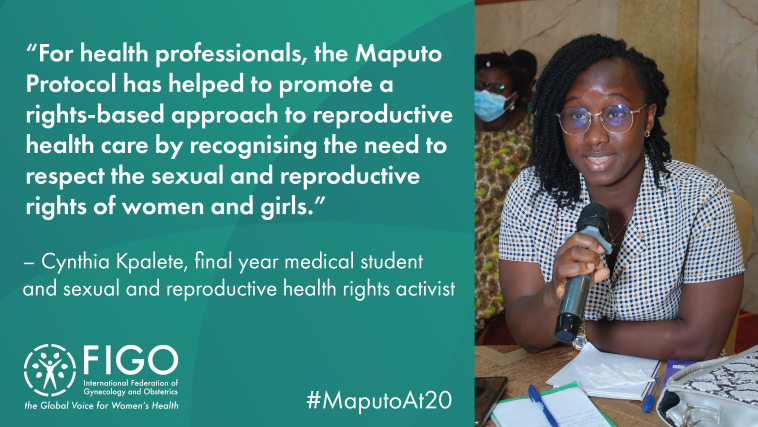Cynthia Kpalete on the Maputo Protocol and reproductive rights in Benin
On 11 July 2023, FIGO is celebrating the 20th anniversary of the Maputo Protocol by sharing reflections from across Africa on how the Maputo Protocol has impacted the practice of obstetrics and gynaecology. Cynthia Kpalete, a final year medical student and activist, shares her thoughts on how the protocol has promoted a rights-based approach to women's health in Benin.

Cynthia Kpalete is a doctor in her final year of training and a sexual and reproductive health rights activist. She is pro-choice, passionate about youth organisations and a committed safe abortion advocate. She is a member of the network of young health professionals for safe abortion and the community of practice of the African Society of Gynaecology and Obstetrics (SAGO).
On the 20th anniversary of the Maputo Protocol, what do you consider to be the main achievements of the Maputo Protocol for you and your work as an obstetrician-gynaecologist?
For health professionals, the Maputo Protocol has helped to promote a rights-based approach to reproductive health care by recognising the need to respect the sexual and reproductive rights of women and girls. It has also helped to strengthen the training and education of health professionals in the field of gynaecology and obstetrics, emphasising the need to provide health care adapted to the needs of our patients. It has also encouraged awareness and promotion of family planning in Africa.
What do you see as the main challenges to implementing the Maputo Protocol in Africa?
There are many challenges to implementing the Maputo Protocol in Africa, including lack of political will in some countries, stigmatisation by service providers and the community, socio-cultural norms and lack of funding to support advocacy initiatives for safe abortion.
How can these challenges be met?
To meet these challenges, it is necessary to:
- Define the boundary between personal convictions and professional duty among healthcare workers in relation to “conscientious objection”.
- Advocate for better access to safe abortion care for girls and women.
- Meet with stakeholders and build strong coalitions around the right to abortion.
- Gather evidence to demonstrate the role of safe abortion in reducing maternal deaths.
- Disseminate information regarding abortion-related laws so that people know whether abortion is permitted in their context and under what conditions.
- Raise awareness so that abortion services do not become a method of contraception.
What recommendations do you have for further strengthening reproductive healthcare services?
To further strengthen reproductive healthcare services, it is essential to increase funding for health programmes, improve awareness and training, reinforce health systems and increase access to health care for rural populations.
Health professionals, particularly obstetricians and gynaecologists, can play a key role in raising community awareness, providing quality care and working with governments and civil society organisations. They can also help to promote sex education and family planning.
Could you give examples of specific initiatives that have been implemented in Benin to promote women's reproductive rights?
In Benin, there are several initiatives aimed at promoting women's reproductive rights and guaranteeing access to quality reproductive health services. These include the National Reproductive Health and Family Planning Programme and the creation of the Youth Coalition for Safe Abortion. In future, one of the key priorities is to make abortion affordable for all women and girls at national level.